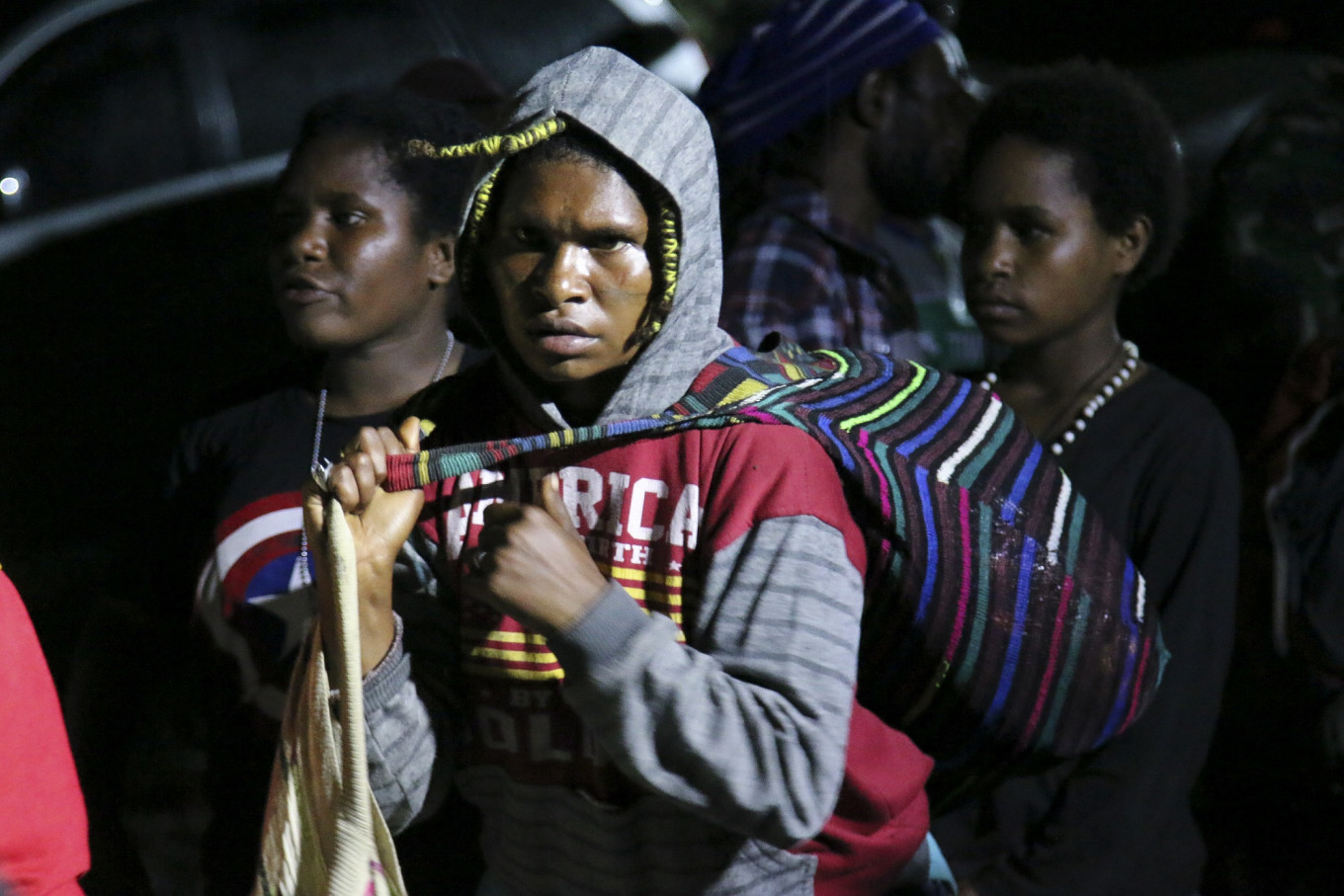Popular Reads
Top Results
Can't find what you're looking for?
View all search resultsPopular Reads
Top Results
Can't find what you're looking for?
View all search resultsIndependent reconciliation body ‘crucial’ to resolve past atrocities in Papua: Experts
Change text size
Gift Premium Articles
to Anyone
 Residents of Tembagapura district in Mimika regency, Papua waits to be evacuated by the Indonesian Military (TNI) and National Police personnel on March 8. Thousands of residents in the area have been displaced from their homes due to armed conflict between security forces and armed criminal groups. (Antara/Sevianto Pakiding)
Residents of Tembagapura district in Mimika regency, Papua waits to be evacuated by the Indonesian Military (TNI) and National Police personnel on March 8. Thousands of residents in the area have been displaced from their homes due to armed conflict between security forces and armed criminal groups. (Antara/Sevianto Pakiding)
E
xperts have made fresh calls to push for the immediate establishment of an independent fact-finding and reconciliation body as part of a long-overdue effort to resolve past human rights violations in Indonesia’s easternmost provinces of Papua and West Papua.
Beka Ulung Hapsara, a commissioner at the National Human Rights Commission (Komnas HAM), emphasized the urgency of the initiative as he called for President Joko “Jokowi” Widodo to address past rights abuses in Papua and West Papua through a truth and reconciliation commission (KKR) in accordance with Article 47 of the 2000 law on human rights courts.
“Considering the urgency of resolving gross violations of human rights and the absence of any legal umbrella for the formation of a KKR, the President may issue a regulation in lieu of law [Perppu] on a KKR,” he said during the Papua Strategic Policy Forum online discussion held on Monday by Yogyakarta-based Gadjah Mada University’s Papua Task Force and the School of Social and Political Sciences’ Capacity Building and Networking Center.
Read also: Papuan groups voice opposition to special autonomy status
He added that Komnas HAM had recommended the establishment of a KKR to Jokowi and several of his aides in 2018.
Beka said it was also crucial for the central government to consider a reparations mechanism designed to compensate Papuans who had been impacted by past human rights violations.
Democratic Alliance for Papua director Latifah Anum Siregar echoed Beka’s sentiments, saying that a KKR and a human rights court were crucial to impunity eradication efforts so that all victims of past rights abuses could get justice.
However, Latifah pointed out a number of roadblocks that had made it difficult for the government to accomplish said ideals, including the state’s own efforts to “protect perpetrators of rights abuses”.
“There’s still a major stigma against Papua. Consequently, all public movements in the region have been lumped in with separatism,” she said during the same event.
“The government is limited by its own paranoia over Papuan separatists, fearing that such reckoning with past rights violations would only serve to enable counter-insurgency.”
The two provinces have been the scenes of serious past human rights abuses, including incidents in Wasior in 2001, Wamena in 2003 and the Paniai shooting in 2014 in which five people, including four students, were allegedly shot by members of the Indonesian Military (TNI) during a protest.
Read also: 'We demand proof, not promises': Papuans urge Jokowi to bring justice to Paniai tragedy
The central government announced in 2016 that it intended to resolve 12 cases of past human rights abuses in Papua, but no significant progress has been made.
Beyond these unresolved serious rights abuses, Papuans have faced decades of discrimination and injustice.
Gabriel Lele, a researcher at Gadjah Mada University’s Papua Task Force, said any reconciliation attempts should not stop at legal proceedings, urging the government to engage in consistent dialogue with victims of rights violations.
Such engagement was vital for a collective recovery, as reconciliation was a psycho-social process, he said.
“To quote Nelson Mandela, ‘There is no peace without forgiveness, there is no forgiveness without justice’,” Gabriel said.
According to Amnesty International, at least 100,000 West Papuans have been killed since the Indonesian takeover of West Papua in the 1960s.
The most recent bout of violence was sparked by racial attacks on Papuan university students in Java last year, which prompted thousands of Papuans to protest against the government. The protests brought renewed media attention to human rights violations in the region and Papuans’ decades-long fight for autonomy.









